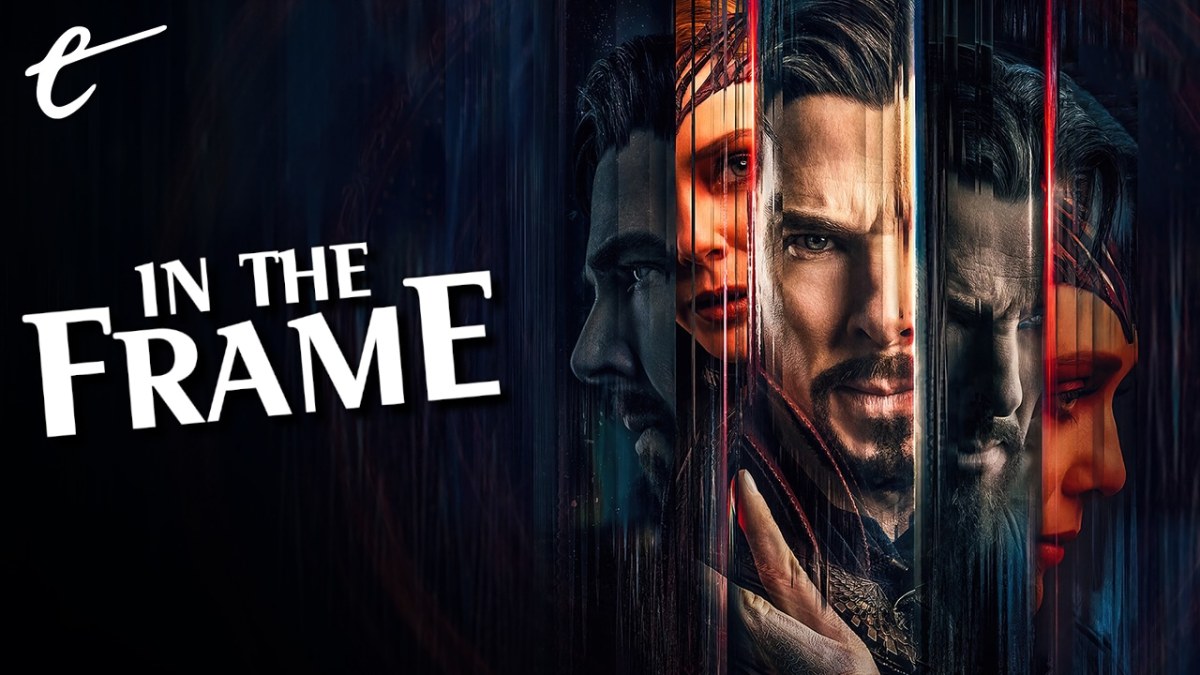This article contains significant spoilers for the version of Doctor Strange in the Multiverse of Madness available in our reality. If you plan to see the movie but haven’t yet, bookmark this page and come back soon!
Appropriately enough, given its title, Doctor Strange in the Multiverse of Madness is a film about the importance of accepting reality as it is rather than what one might want it to be.
One of the big existential questions arising from the existence of the multiverse is that of agency. After all, if an infinite number of alternate dimensions exist, wherein any character can follow any possibility to its logical endpoint, what does that say about the importance of choice? If the world that a character inhabits is just one of a branching nexus of causality, with every choice creating an alternate path, then what does it matter that a character has ended up where they are now?
Scott Derrickson’s Doctor Strange was a surprisingly fatalistic superhero movie, the rare blockbuster that was largely built around the inevitability of time and the certainty of death. In that movie, Stephen Strange (Benedict Cumberbatch) learns that the flow of time cannot be stopped and that change and death are inescapable facets of human existence. Multiverse of Madness is a worthwhile companion piece because it extends that theme in interesting directions.
Throughout Multiverse of Madness, Strange is repeatedly confronted with a seemingly simple question, “Are you happy, Stephen?” His old girlfriend, Christine Palmer (Rachel McAdams), asks this when she finds him resting at the bar at her wedding reception. The obvious inference is that Strange is not happy. He finds himself reflecting on the road not taken, in particular his missed opportunity with Christine. Could things have been different? Could he have made different choices?

His old colleague Nicodemus West (Michael Stuhlbarg) challenges Strange on this point when they meet shortly before the ceremony. West was turned to dust during “the Blip” at the end of Avengers: Infinity War and restored at the climax of Avengers: Endgame. He missed five years of life, including the death of his brother. He repeats the comforting assurance that there was no other way, mirroring Strange’s own dialogue in Infinity War, but he presses Strange for confirmation.
Multiverse of Madness understands how powerful Stephen Strange is, even if he lost the role of Sorcerer Supreme to Wong (Benedict Wong) on “a technicality.” The movie overtly compares his power to that of a god. When Christine looks for wine at her wedding, Strange converts a glass of water at the bar, evoking Jesus Christ’s miracle at Cana. Director Sam Raimi constantly frames Cumberbatch so Strange — and his doppelgängers — appear to have halos around their heads.
It would be very easy for a person of Strange’s power to warp reality to fit their desire. Indeed, much of the Marvel Cinematic Universe is built around the power fantasy that these exceptional individuals have the moral authority to reshape the world to their whims. Multiverse of Madness focuses on Wanda Maximoff (Elizabeth Olsen) as a foil to Strange. Like Strange, she is haunted by the path not taken. Like Strange, she has the power to reorder reality to her specifications.
In WandaVision, Wanda held the entire town of Westview hostage to live out the fantasy of suburban domesticity with her deceased lover, Vision (Paul Bettany). Treating the town’s inhabitants as brainwashed meat puppets, Wanda conjured a fantasy world for herself, where she was given everything that she felt she was owed. It was horrific, but the most unsettling aspect of WandaVision was that Wanda was portrayed as an unambiguous hero despite the harm that she caused.

“They’ll never know what you sacrificed for them,” Monica Rambeau (Teyonah Parris) told Wanda as she left the community. Tellingly, Doctor Strange in the Multiverse of Madness suggests that this is still the default narrative. Wanda has not been punished for her crimes. Strange tracks her down quite easily, seeking to consult with her on the case of a multiversal refugee, America Chavez (Xochitl Gomez). Strange nonchalantly shrugs off the events of WandaVision. He doesn’t see anything wrong.
However, Multiverse of Madness cleverly sees right through this. Wanda is still living in a fantasy. In fact, Wanda was the power that was chasing America through the multiverse. It’s a nice plot beat that, barring a tiny slip-up from Wanda, Strange would have willingly (and eagerly) handed the young refugee over to the very monster chasing her. It’s a smart piece of writing that makes an astute comment about the limits of superheroism within this shared universe.
Much like Strange wonders about the life that he might have had with Christine, Wanda seeks to be reunited with the imaginary children (Julian Hilliard and Jett Klyne) that she manifested in Westview. Wanda cannot accept reality as it is, and so instead she seeks to bend reality to her will. She plans to harness America’s power to traverse the multiverse and to use it to find some other alternate world where she can be with her children. She does not care how many innocent people suffer.
There is an interesting timeliness to Doctor Strange in the Multiverse of Madness. That probably isn’t too surprising given the movie’s famously hectic production cycle, which led to it being extensively rewritten during production with the script often changing “minutes before [shooting].” At its heart, Multiverse of Madness is a movie about the need to accept reality as it is and the dangers that come from rejecting it in pursuit of an idealized fantasy.

Wanda is the most obvious illustration of this theme, with her refusal to acknowledge that her children never even existed breaking reality itself. However, Strange faces similar challenges. The movie presents a number of alternate versions of Strange, including one that has become corrupted by the Darkhold, the power that Wanda seeks to exploit. That Strange became so obsessed with Christine that he tore through the multiverse looking for a world where they were together.
Multiverse of Madness presents this sort of rejection of an individual’s reality as inherently dangerous to the entire world. In one reality, Reed Richards (John Krasinski) explains that his version of Strange’s expeditions lead to “Incursions” that killed entire worlds. Later on, Strange escapes with an alternate version of Christine into a version of New York where Strange’s multiversal machinations caused reality to “fold in on itself,” creating a world of nightmares.
These aren’t abstract comic book themes. Multiverse of Madness arrives in a world where the grip on consensus reality seems looser than ever. Significant portions of the American population appear to have lost touch with reality, with polls suggesting that between 25% and 40% of the public refuse to accept the outcome of the last presidential election. Many of these people live in their own pocket realities — not unlike Wanda’s — shaped by social media bubbles and extremist news channels.
It should go without saying that this is a very bad thing. The inability of a significant portion of the public to accept reality makes it very difficult for democracy to function. It divides families, pushes competent public servants out of key roles and radicalizes communities. It makes even basic communication impossible, as those who have broken from reality can seem to be speaking their own language. It’s not as literal as an apocalyptic landscape, but reality is broken.

Doctor Strange in the Multiverse of Madness occasionally even seems to directly invoke this reading. Given the primary colors of their costumes, Multiverse of Madness is a literal battle between blue and red, reality and fantasy, for the soul of America. At one point, Strange’s trademark red cloak is torn, and the alternate Christine patches it up with some blue cloth. The result is to suggest the colors of the American flag. “America, I came to tell you to trust yourself, to trust your power,” Strange argues at the movie’s climax.
After all, like Spider-Man: No Way Home, the multiverse story at the heart of Multiverse of Madness is framed as an immigration metaphor. To its credit, Multiverse of Madness is a lot clearer in its allegory, compared to the more muddled subtext of No Way Home. Tellingly, America’s multiversal journey is triggered by fear and terror. She does not travel lightly. She is a refugee, a child separated from her parents who is desperately looking for a new home.
As such, Multiverse of Madness becomes the story of how people with power treat these dispossessed immigrants. Wanda is willing to let America suffer and die, in the hope of recapturing an idealized and nostalgic past that never existed outside of sitcoms. When Strange and America arrive in an alternate world controlled by “the Illuminati,” they find themselves locked away without due process, with Strange and America separated from one another.
Naturally, the Illuminati are not so different from Wanda. They have rejected reality in their own way. They have built statues and museums to their deceased version of Stephen Strange, cultivating a heroic mythology around him. The reality that they have concealed from the world at large is that Strange was no hero, that his obsessions threatened multiple worlds. They haven’t literally altered reality, but they have rewritten history. Inevitably, their world comes crumbling down.
In some ways, Doctor Strange in the Multiverse of Madness feels much closer to the warm humanism of Sam Raimi’s Spider-Man trilogy than to many of its shared universe contemporaries. It is a superhero movie in which the power to reject or reshape reality is presented as inherently monstrous. Like with Spider-Man (Tobey Maguire), Strange’s heroism ultimately comes from understanding the responsibility that comes with power and accepting the world as it is rather than how he wishes it were.






Published: May 6, 2022 11:00 am